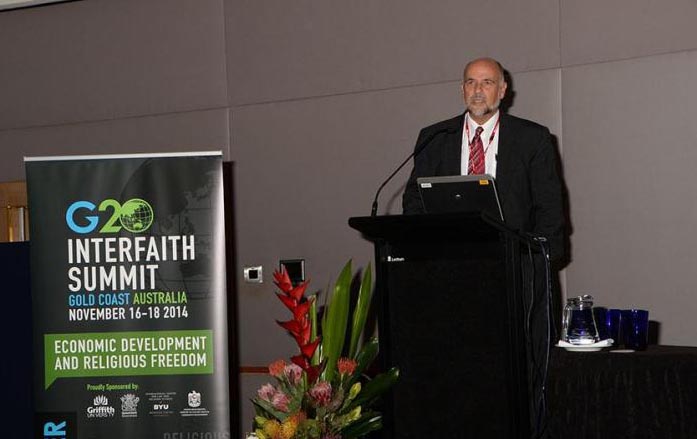ID :
348831
Sun, 11/23/2014 - 10:47
Auther :
Shortlink :
https://oananews.org//node/348831
The shortlink copeid
G20 Interfaith Summit reviews U.A.E.'s experience in religious freedom, tolerance and co-existence

Abu Dhabi (WAM): Sheikh Nahyan bin Mubarak Al Nahyan, Minister of Culture, Youth and Community Development, has affirmed the importance of resolutions of the G20 Interfaith Summit to solve problems facing the humanity through the religious dialogue as a way for co-operation to achieve happiness for all mankind.
Sheikh Nahyan underlined the significance of dialogue among religions and cultures, adding that the U.A.E. encourages dialogue to build communication bridges and understanding. "Dialogue will contribute to finding areas of common interest among followers of various religions and cultures, and will help strengthen proper relations among them." He also added that the U.A.E.'s multicultural society proves that it safeguards the freedom of belief and worship and provides an appropriate atmosphere for understanding, a policy that has facilitated cultural interactions and enhanced values such as religious freedom, peace, tolerance, coexistence and mutual respect.
Sheikh Nahyan added, "All these values were gleaned from the far-sighted vision of President His Highness Sheikh Khalifa bin Zayed Al Nahyan, and were instilled by the late founder Sheikh Zayed bin Sultan Al Nahyan. These were meant to deal with the multiplicity of human cultures and civilisations." The Minister thanked the organisers of the G20 Interfaith Summit in Australia, stressing that conferring of this prestigious award upon him by the global organisation is an international recognition of the U.A.E.'s efforts in building a distinct and distinguished society, open to other civilisations, and proves that it is a role model for peaceful coexistence among religions and cultures.
He added, "This also shows the U.A.E. follows a policy of development, welfare and achievement focus on happiness of the society", adding that this reflects the U.A.E.'s rich historic legacy when it comes to peaceful coexistence among religions.
He also added that this underscores the U.A.E.'s stature as being a hub of dialogue among various religions and cultures by providing wider horizons for interaction to shed light on common values among all religions, stressing that all the country's legislative, educational and cultural departments have worked towards enhancing dialogue and a culture of tolerance through freedom of thinking and belief, as well as acceptance of pluralism and rejection of violence, extremism and narrow-mindedness.
Sheikh Nahyan made these remarks as the U.A.E.'s participation came to a conclusion. The U.A.E. was represented by the Ministry of Culture's delegation at the Interfaith Summit held on the sidelines of G20 Summit in Australia.
In a related context, the U.A.E. delegation held a special session on the topic of the U.A.E. being a model for religious freedom, tolerance and peaceful religious coexistence.
The session also witnessed the participation of top church leaders in the U.A.E. and the Emirati thinker, Dr. Yousef Al-Hassan.
At the beginning of the session, Yousef al Hassan, former Director of the Emirates Institute of Diplomacy, gave a presentation on the public outline of the U.A.E. as a model for tolerance and peaceful coexistence in the light of its constitutional framework. He also briefed them on a host of previous practical experiences of the country in this regard such as setting up places of worship for non- Muslims.
Dr. Yousef demonstrated the U.A.E.'s experience in the field of development through being open to the other, stability in work and interactions, citing the vision of the late Sheikh Zayed bin Sultan Al Nahyan in the field of humanitarian work in a number of countries regardless of their beliefs.
Surender Sing Kandhari, Chairman of the Gurunanak Darbar Temple in Jebel Ali, Dubai, thanked the U.A.E. leadership for granting Sikh a plot free of charge in Jebel Ali to build the Sikh Temple, adding that 50, 000 Sikh live in the U.A.E.. He called on the G20 Interfaith Summit to continue such dialogues, which promote co-existence, peace, stability and welfare.
Cameron Arensen, pastor of the Evangelical Community Church, briefed the Summit on experience of his sect in the U.A.E., citing tolerance, support and hospitality being exhibited by the U.A.E. leadership and people. He invited the audience to visit the U.A.E. to acquaint with a unique religious tolerance.
Reverend Andrew Thompson, the senior pastor at Abu Dhabi’s St Andrew’s Church, said, "I'm delighted to present the U.A.E. model, which represents an exemplary religious tolerance for Christians in the world", adding that the G20 Interfaith Summit has shown the U.A.E.'s best Islamic values in terms of generosity, hospitality and tolerance.
Dr. Robert Batman, head of the Mormon Sect spoke about his personal experience in the U.A.E. and the administrative and financial support he received from Emiratis, including police officer. He added that the religious leaders who attended the G20 Interfaith were briefed about the U.A.E.'s religious tolerance and co-existence, a model he said would be reciprocated by different countries and peoples.
Dr. Isaiah Haroon, representative of Coptic Church demonstrated the history of Coptic Church in the U.A.E. amid audience applause. The Coptic Church is the oldest Church on earth. The first Coptic sermon was held in Abu Dhabi in 1974, while the first Church was built in the Churches' complex in 1984. The late Sheikh Zayed bin Sultan Al Nahyan allocated a plot, where the first Coptic Cathedral in the Gulf was built and opened by Pope Shenoda III in 2007. The Copts are 20, 000 in the U.A.E., where they pray freely in seven Churches across the country.
Dr. Haroon spoke of humanitarian gestures of His Highness General Sheikh Mohamed bin Zayed Al Nahyan, Crown Prince of Abu Dhabi and Deputy Supreme Commander of the U.A.E. Armed Forces, noting that without his unlimited support the Coptic Cathedral would not have been built.
The six papers were applauded by the audience, who commended the U.A.E. religious tolerance and co-existence, a model that exhibits the religious tolerance as a core of economic development, social stability and happiness. – Emirates News Agency, WAM - http://www.wam.ae/en/news/emirates/1395272811796.html





